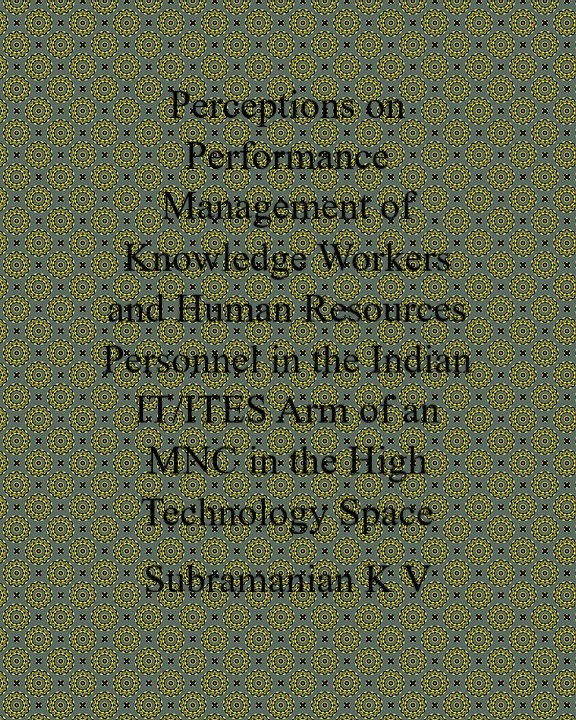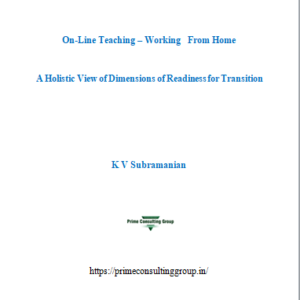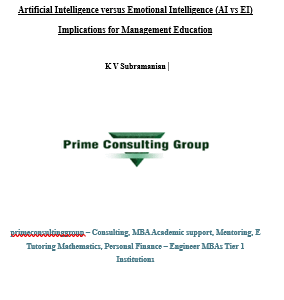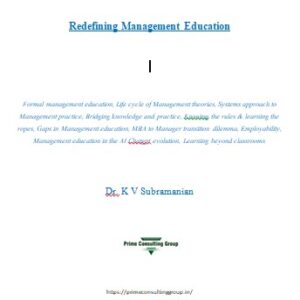Original price was: ₹850.00.₹800.00Current price is: ₹800.00.
This book is an outcome of a Management Research on Perceptions on Performance Management of Knowledge Workers (KWs) and Human Resources (HR) Personnel in the Indian IT / ITES Arm of an MNC in the High Technology Space, was carried out as a Management Challenge assignment to meet the partial requirements of an MBA programme. The IT and ITES industry is highly manpower-driven, with manpower costs contributing as much as 50% of operating costs. Managing the KWs itself became a challenge that led to the need for better understanding of the KWs, the evolution of management processes, and research and innovation in HR practices, with organizational success becoming synonymous with success in managing HR. The success of the HR function in the management of KWs is driven by close alignment between the KWs and HR perceptions.
Description
This research, Perceptions on Performance Management of Knowledge Workers (KWs) and Human Resources (HR) Personnel in the Indian IT / ITES Arm of an MNC in the High Technology Space, was carried out as a Management Challenge assignment to meet the partial requirements of an MBA programme
The choice of topic of the study was motivated by the explosive and expected growth of the IT and ITES industry globally, and the challenges of managing the knowledge workforce in this knowledge-driven industry. KWs differ from conventional workers in the brick and mortar manufacturing sector. KWs carry out creative tasks as against repetitive mass production in the traditional industry. This makes the KWs unique in terms of their profile, expectations, performance measures, and measurement, as well as in terms of the factors contributing to their productivity, motivation, acquisition, and retention and, in turn, the competitiveness of the organization employing them.
The Indian arm of an MNC was chosen for the study as India has, since the early nineties, acquired the sobriquet of the world’s back office. At this time, technological revolution led to evolving paradigms of remote working and the globalization of economic activity through the outsourcing of tasks to low cost geographies, in order to retain global competitiveness and to access trained manpower. This resulted in the fast growth of the IT and ITES industry in India.
The growth of the industry was accompanied by the pains of managing that growth. The IT and ITES industry is highly manpower-driven, with manpower costs contributing as much as 50% of operating costs. Managing the KWs itself became a challenge that led to the need for better understanding of the KWs, the evolution of management processes, and research and innovation in HR practices, with organizational success becoming synonymous with success in managing HR. The success of the HR function in the management of KWs is driven by a deeper understanding of KWs’ perceptions on performance / expectations, and closer alignment between the KWs and HR perceptions.
This study was thus prompted by the realization of the importance of perceptional alignment between the KWs and HR. In the industrial era, HR management was perceived to be the efficient utilization of manpower as a tool rather than as a key resource to be understood, nurtured, motivated, respected, and carried along with the management for the organization’s success. The consistent, double-digit, profitable growth of the industry attracted foreign investment that sought ways for it to remain competitive and grow, a key strategy being efficient and innovative human resource management for which understanding perceptions was critical.
This study has brought to light some interesting findings which provide pointers for HR management. Whilst it has been carried out in a limited space with limited time and resources, the study has unearthed some of the perceptional alignments and gaps between the KWs and HR, and we believe that both management and HR will take cues from these.
As a study based on a limited sample of 65 respondents, there is immense scope for deeper and wider examination of the subject using study subjects from multiple geographies and cultures. We believe this study would be of some value to researchers, academics, and businesses in terms of its methodologies and its findings.





